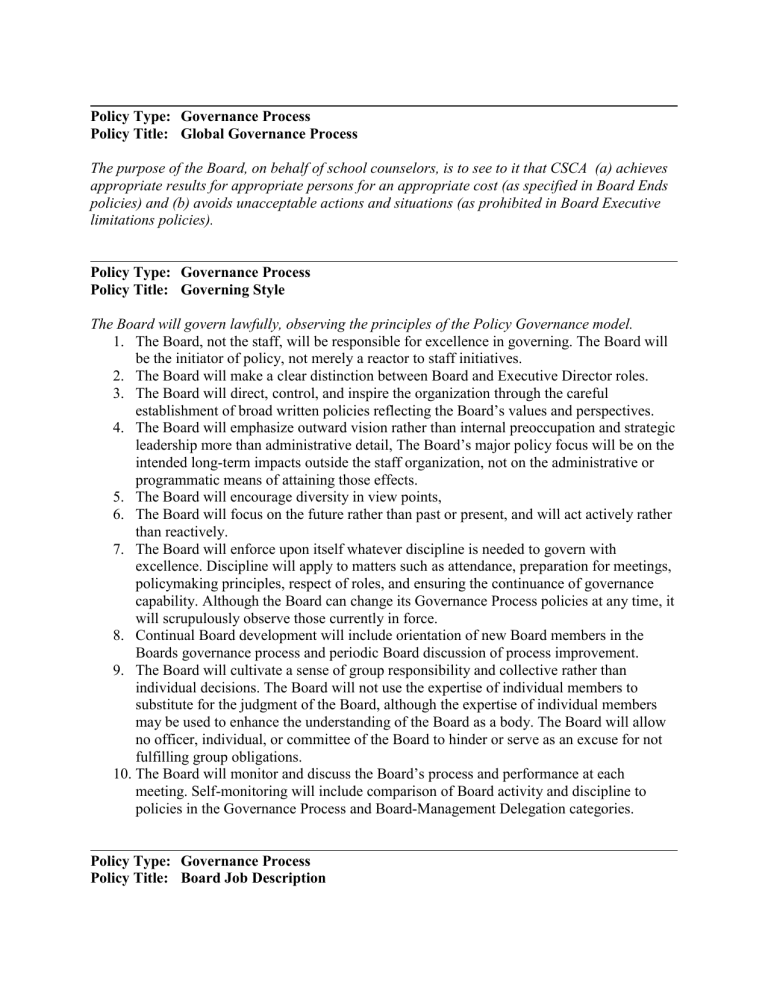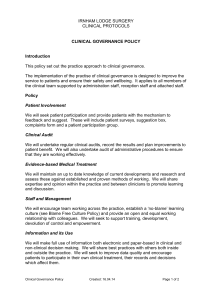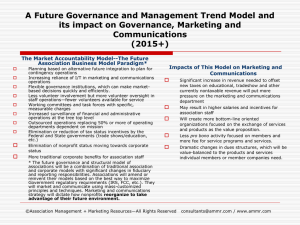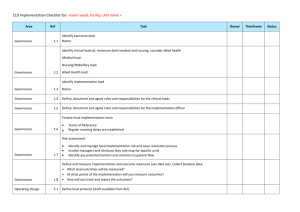Policy Type: Governance Process Policy Title: Global Governance

Policy Type: Governance Process
Policy Title: Global Governance Process
The purpose of the Board, on behalf of school counselors, is to see to it that CSCA (a) achieves appropriate results for appropriate persons for an appropriate cost (as specified in Board Ends policies) and (b) avoids unacceptable actions and situations (as prohibited in Board Executive limitations policies).
Policy Type: Governance Process
Policy Title: Governing Style
The Board will govern lawfully, observing the principles of the Policy Governance model.
1.
The Board, not the staff, will be responsible for excellence in governing. The Board will be the initiator of policy, not merely a reactor to staff initiatives.
2.
The Board will make a clear distinction between Board and Executive Director roles.
3.
The Board will direct, control, and inspire the organization through the careful establishment of broad written policies reflecting the Board’s values and perspectives.
4.
The Board will emphasize outward vision rather than internal preoccupation and strategic leadership more than administrative detail, The Board’s major policy focus will be on the intended long-term impacts outside the staff organization, not on the administrative or programmatic means of attaining those effects.
5.
The Board will encourage diversity in view points,
6.
The Board will focus on the future rather than past or present, and will act actively rather than reactively.
7.
The Board will enforce upon itself whatever discipline is needed to govern with excellence. Discipline will apply to matters such as attendance, preparation for meetings, policymaking principles, respect of roles, and ensuring the continuance of governance capability. Although the Board can change its Governance Process policies at any time, it will scrupulously observe those currently in force.
8.
Continual Board development will include orientation of new Board members in the
Boards governance process and periodic Board discussion of process improvement.
9.
The Board will cultivate a sense of group responsibility and collective rather than individual decisions. The Board will not use the expertise of individual members to substitute for the judgment of the Board, although the expertise of individual members may be used to enhance the understanding of the Board as a body. The Board will allow no officer, individual, or committee of the Board to hinder or serve as an excuse for not fulfilling group obligations.
10.
The Board will monitor and discuss the Board’s process and performance at each meeting. Self-monitoring will include comparison of Board activity and discipline to policies in the Governance Process and Board-Management Delegation categories.
Policy Type: Governance Process
Policy Title: Board Job Description
Specific job products of the Governing Board, as an informed agent of the membership, are those that ensure appropriate organizational performance.
1.
The Board is the linkage between the membership and the operational organization.
2.
The Board writes governing policies that realistically address the broadest levels of all organizational decisions and situations. a.
Ends: The organizational impacts, benefits, outcomes; recipients, beneficiaries, impacted groups; and their relative worth in cost or priority b.
Executive Limitations: Constraints on the Executive Director that establish the prudence and ethics boundaries within which all executive activity and decisions must take place c.
Governance Process: Specification of how the Board conceives, carries out, and monitors its own task d.
Board-Management Delegation: How power is delegated and its proper use monitored; the Executive Director role, authority, and accountability
3.
The Board ensures successful organizational performance on Ends and Executive
Limitations. a.
To accomplish its job products with a governance style consistent with Board policies, the Board will follow an annual agenda that (a) completes a re-exploration of
Ends policies and (b) continually improves Board performance through Board education and enriched input and deliberation.
1.
The cycle will conclude each year on the last day of June so that administrative planning and budgeting can be based on accomplishing a one-year segment of the
Board’s most recent statement of long-term Ends.
2.
The Board’s development of its agenda for the next year includes: a.
Consultations with selected groups in the ownership or other methods of gaining ownership input will be determined, arranged and held during the current year. b.
Governance education and education related to ends determination
(presentations by futurists, demographers, advocacy groups, staff, and so on) will be determined, arranged and held during the current year. c.
A Board member may recommend or request an item for Board discussion by submitting the item to the President prior to the Board meeting and at the discretion of the Prez .
3.
Executive Director monitoring will be on the agenda if reports have been received since the previous meeting, if plans must be made for monitoring through direct inspection by the Board, or if arrangements for third-party monitoring must be prepared.
Policy Type: Governance Process
Policy Title: President’s Role
The President is a specially empowered member of the Board who ensures the integrity of the
Board’s process and, secondarily, occasionally represents the Board to outside parties.
1.
The assigned result of the President’s job is that the Board behaves consistently with its own rules and those legitimately imposed upon it from outside the organization. a.
Meeting discussion content will consist solely of issues that clearly belong to the
Board to decide or to monitor according to Board policy. b.
Information that is neither for monitoring performance nor for Board decisions will be avoided or minimized and always noted as such. c.
Deliberation will be fair, open, and thorough but also timely, orderly, and kept to the point.
2.
The authority of the President consists in making decisions that fall within topics covered by Board policies on Governance Process and Board-Management Delegation, with the exception of areas where the Board specifically delegates portions of this authority to others. The President is authorized to use any reasonable interpretation of the provisions in these policies. a.
The President develops Board meeting agendas and sends them to Board members preferably 14 days prior to a meeting. The President is empowered to chair Board meetings with all the commonly accepted powers of that position, such as ruling and recognizing. b.
The President may represent the Board to outside parties in announcing Board-stated positions and in stating President decisions and interpretations within the area delegated to that role. c.
The President may delegate his or her authority as described in Governing Process policy 3c, but remains accountable for its use.
Policy Type: Governance Process
Policy Title: Board Members’ Code of Conduct
The Board commits itself and its members to ethical, businesslike, and lawful conduct, including proper use of authority and appropriate decorum when acting as Board members.
1.
Members must demonstrate loyalty to the membership , unconflicted by loyalties to staff, other organizations, or any personal interest as consumers.
2.
Members must adhere to the ASCA Ethical and Legal Standards for School Counselors and the ASCA Ethical and Legal Standards for Leaders of School Counselor
Associations.
3.
Members must avoid conflict of interest with respect to their fiduciary responsibility. a.
There will be no self-dealing or business by a member with the organization.
Members will annually disclose their involvements with other organizations or with vendors and any associations that might be reasonably seen as representing a conflict of interest. b.
When the Board is to decide upon an issue about which a member has an unavoidable conflict of interest, that member will withdraw without comment not only from the vote but also from the deliberation.
4.
Board members may not attempt to exercise individual authority over the organization. a.
Members’ interaction with the Executive Director or with staff must recognize the lack of authority vested in individuals except when explicitly authorized by the
Board.
b.
Members’ interaction with the public, the press, or other entities must recognize the same limitation and the inability of any Board member to speak for the Board except to repeat explicitly stated Board decisions. c.
Except for participation in Board deliberation about whether the Executive Director has achieved any reasonable interpretation of Board policy, members will not express individual judgments of performance of employees or the Executive Director.
5.
Members will respect the confidentiality appropriate to issues of a sensitive nature.
6.
Members will be properly prepared for Board deliberation.
7.
Members will support the legitimacy and authority of the final determination of the
Board.
Policy Type: Governance Process
Policy Title: Board Committee Principles
Board committees, when used, will be assigned to reinforce the wholeness of the Board’s job and never to interfere with delegation from Board to Executive Director.
1.
Board committees are to help the Board do its job, never to help or advise the staff.
Committees ordinarily will assist the Board by preparing policy alternatives and implications for Board deliberation. In keeping with the Board’s broader focus, Board committees will normally not have direct dealings with current staff operations.
2.
Board committees may not speak or act for the Board except when formally given such authority for specific and time-limited purposes. Expectations and authority will be carefully stated in order to prevent conflict with authority delegated to the Executive
Director.
3.
Board committees cannot exercise authority over staff. The Executive Director works for the full Board, and will therefore not be required to obtain the approval of a Board committee before an executive action.
4.
Board committees are to avoid over-identification with organizational parts rather than the whole. Therefore a Board committee that has helped the Board create policy on some topic will not be used to monitor organizational performance on that same topic.
5.
Committees will be used sparingly and ordinarily in an ad hoc capacity.
6.
This policy applies to any group that is formed by Board action, whether or not it is called a committee and regardless of whether the group includes Board members. It does not apply to committees formed under the authority of the Executive Director.
Policy Type: Governance Process
Policy Title: Cost of Governance
The Board will invest in its governance capacity because poor governance costs more than learning to govern well.
1.
Board skills, methods, and supports will be sufficient to ensure governing with excellence.
a.
Training and retraining will be used liberally to orient new members and candidates for membership, as well as to maintain and increase existing members’ skills and understandings. b.
Outside monitoring assistance will be arranged so that the Board can exercise confident control over organizational performance. This includes but is not limited to financial audit. c.
Outreach mechanisms will be used as needed to ensure the Board’s ability to listen to owner viewpoints and values. This includes but is not limited to surveys, focus groups and opinion analyses.








